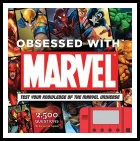Marvel Comics,
1980 and Beyond!
Marvel Comics continued it meteoric foothold in the comics industry. The 1980s saw some continued advancement and major changes (for the good or bad may depend on your point of view).
It was at this time
period that Jim Shooter was Marvel's Editor-in-Chief. Shooter had, what
many consider, a controversial personality, but he cured many of the
procedural ills plaguing Marvel at the time (including repeatedly missed
deadlines). He continued to oversee a creative renaissance at the
company.
This
renaissance included institutionalizing creator royalty and starting
the Epic imprint for creator-owned material in 1982. But, in the long
run, Shooter was still accused by many creators, especially near the end
of his tenure, of exercising his job in a draconian manner and
interfering with the writers' creative processes.
In 1981 Marvel Comics purchased the well-known DePatie-Freleng Enterprises animation studio. The studio was owned by famed Looney Tunes director Friz Freleng and his business partner David H. DePatie. The company was renamed Marvel Productions. It produced well-known animated TV series and movies featuring such characters as G.I. Joe, The Transformers, Jim Henson's Muppet Babies, and Dungeons & Dragons. Also produced were cartoons based on Marvel characters, including Spider-Man and His Amazing Friends.
In 1988, Marvel Comics was bought by investor/entrepreneur Ronald Perelman, who took the company public on the New York Stock Exchange. He oversaw a great increase in the number of titles the company published. As part of the process, Marvel Productions sold its back catalog to Saban Entertainment, and Marvel management closed the animation studio, opting to outsource.
Marvel of the 1990s
Marvel earned a great deal of money and recognition during the comic-book boom of the early 1990s. Contributing to their success were some of their flagship characters such as X Men, Avengers, Spider Man, and Fantastic Four. However, Marvel also launched the unsuccessful cyberpunk 2099 line of comics set in the future (Spider-Man 2099 etc.) and the creatively obscure and commercially unsuccessful Razorline imprint of superhero comics created by novelist and filmmaker Clive Barker.
Largely due to the poor sales relating to these titles, which were not received well at all by current fans, Marvel filed for bankruptcy. At this point there were many accusations that Perelman had strip-mined the company for his own gain. Casualties in this legal maneuver included the comic-book distribution industry in 1994, when Marvel Comics announced it was acquiring Heroes World to use as its exclusive distributor.
As the industry's major publishers made exclusive distribution deals with other companies, the majority of the major comic book distributors were thrown out of business. Marvel's plan failed, and by the end only Diamond Comic Distributors Inc. survived as the major distributor of comic books in North America. This was a development that many comic retailers believed profoundly damaged the business status of the industry.
It was at this point that investor Carl Icahn arrived on the scene and attempted to take control of Marvel. After protracted legal battles, in 1997 control of the company finally landed in the hands of Isaac Perlmutter, owner of the Marvel subsidiary Toy Biz. With his business partner Avi Arad, publisher Bill Jemas and editor-in-chief Bob Harras, Perlmutter helped Marvel Comic back on its feet. They did this largely by returning to the fan favorites, X Men, Avengers, and Fantastic Four. In addition to Marvel’s revitalizing of its comic book line, several of its properties have been licensed to become hit movies, most notably X-Men and Spider-Man.
Enter Marvel into the 2000s
With the new millennium, Marvel Comics having gotten past bankruptcy, again began diversifying its offerings. In 2001, they withdrew from the Comics Code Authority and established their own Marvel Rating System for comics.
They also created new imprints, such as MAX, a line intended for mature readers, and Marvel Age, developed for younger audiences, including children. And in addition they also created the highly successful Ultimate Marvel imprint. With this imprint they rebooted their major titles by deconstructing and updating their major characters to be introduced to a new generation. This allowed Marvel to capitalize on an influx of new readers who were not familiar with comics but had been influenced through major film franchises, thus making it easier for a mainstream audience to follow. The company had also revamped its graphic novel division, establishing a bigger presence in the bookstore market.
Marvel remains a key publisher in the comics business, even as the industry has dwindled to a fraction of its peak size decades earlier. Stan Lee is no longer officially connected to the company, save for the title of "Chairman Emeritus," but remains a visible face in the industry and occasionally remarks on his fondness for the characters.
In 2002, Stan successfully sued for a share of income related to movies and merchandising of Marvel characters, based on a contract between Lee and Marvel from the late 1990s. Marvel has also become a key player in Hollywood, with many of its characters being turned into successful film franchises, the highest-grossing being those of the X-Men, starting in 2000, and Spider-Man, beginning in 2002.
To discover the history of Marvel Comics editor-in-chief roll, scroll down to the bottom of the page and click on through.
More for Marvel Comics Fans
To see what Marvel is up to today, you can visit their official site at
Marvel Comics.
There also looks to be quite a varied assortment of all things Marvel at Amazon that may tickle your taste buds. Just click on the image to the right. Don’t stay too long though, and come back here.
If you want to keep up on the varied and interesting activities going on in the world of comic books, then feel free to sign up for my newsletter “Comics Galore” in the form below. And by all means, I would love to hear your comments and opinions on Marvel Comics. You can sure leave them for me at my contact page in the menu at the left. I may even be able to include them in my newsletter. I thank you ahead of time.
Dave Gieber










New! Comments
Have your say about what you just read! Leave me a comment in the box below.